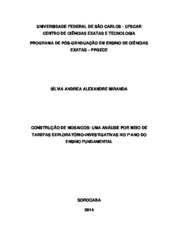| dc.contributor.author | Miranda, Sílvia Andrea Alexandre | |
| dc.date.accessioned | 2016-06-02T20:02:55Z | |
| dc.date.available | 2014-10-02 | |
| dc.date.available | 2016-06-02T20:02:55Z | |
| dc.date.issued | 2014-05-15 | |
| dc.identifier.uri | https://repositorio.ufscar.br/handle/ufscar/4460 | |
| dc.description.abstract | The present study aimed to analyze how an education that prioritizes tasks of exploratory- investigative nature can contribute to the generation and/or mobilization of geometric concepts in the 7th grade students of elementary school. More specifically, the tasks contained in this dissertation fieldwork, contemplated the learning of geometrical concepts involved in the composition of mosaics with regular polygons. The investigation of a qualitative nature, in the form of case study occurred in a public school in the town of Pilar do Sul, the state of São Paulo, where the information was produced and collected between the first and the second semester of 2013. The technique of triangulation of data involved audio, video and photographs records, students written records and observation notes of the participant teacher - researcher. To describe and analyze the process of students learning we support in Ponte (2009 ) and his various studies on exploratory and investigative tasks, in Fischbein (1993 ) with the theory of figural concepts and Tall (1995); who studied the phases of human activity and mathematical reasoning. The survey results allowed to identify the students progress and difficulties to explore the tasks over time they were performed. With the experiences, the students began to develop clearer written records and used a mathematical language with greater mastery of mathematical terms, in particular the geometry. Furthermore, they demonstrated appropriating and/or expand figural concepts like angles, straight, regular polygons and mobilized such knowledge during the exploration of the properties and relations of these objects. | eng |
| dc.format | application/pdf | por |
| dc.language | por | por |
| dc.publisher | Universidade Federal de São Carlos | por |
| dc.rights | Acesso Aberto | por |
| dc.subject | Geometria | por |
| dc.subject | Mosaico | por |
| dc.subject | Ensino fundamental | por |
| dc.subject | Mosaic | eng |
| dc.subject | Elementary education | eng |
| dc.subject | Exploratory-investigative tasks | eng |
| dc.subject | Geometry | eng |
| dc.subject | Tarefa exploratório-investigativa | por |
| dc.title | Construção de mosaicos: uma análise por meio de tarefas exploratório-investigativas no 7°ano do ensino fundamental | por |
| dc.type | Dissertação | por |
| dc.contributor.advisor1 | Oliveira, Paulo César | |
| dc.contributor.advisor1Lattes | http://lattes.cnpq.br/7516513469811353 | por |
| dc.description.resumo | A presente pesquisa teve como objetivo, analisar como um ensino que prioriza tarefas de natureza exploratório-investigativas pode contribuir para a geração e/ou mobilização de conceitos geométricos em alunos do 7º ano do Ensino Fundamental. Mais especificamente, as tarefas contidas no trabalho de campo desta dissertação, contemplaram a aprendizagem de conceitos geométricos envolvidos na composição de mosaicos com polígonos regulares. A investigação de natureza qualitativa, na modalidade estudo de caso, ocorreu em uma escola pública estadual do município de Pilar do Sul, interior do Estado de São Paulo, sendo que as informações foram produzidas e coletadas entre o 1º e 2º semestre de 2013. A técnica da triangulação dos dados envolveu registros de áudio, vídeo, fotografias, registros escritos dos alunos e anotações da observação participante da professora-pesquisadora. Para descrever e analisar o processo de aprendizagem dos alunos nos apoiamos em Ponte (2009) e seus diversos estudos sobre tarefas exploratórias e investigativas, em Fischbein (1993) com a teoria dos conceitos figurais e Tall (1995); que estudou as fases da atividade humana e o raciocínio matemático. Os resultados da pesquisa permitiram identificar os avanços e dificuldades dos alunos ao explorarem as tarefas ao longo do tempo em que foram realizadas. Com as experiências vivenciadas, os alunos passaram a elaborar registros escritos mais claros e utilizaram a linguagem matemática com maior domínio de termos matemáticos, em especial, os geométricos. Além disso, demonstraram se apropriar e/ou ampliar conceitos figurais como ângulos, retas, polígonos regulares e mobilizaram tais conhecimentos durante a exploração das propriedades e relações desses objetos. | por |
| dc.publisher.country | BR | por |
| dc.publisher.initials | UFSCar | por |
| dc.publisher.program | Programa de Pós-Graduação em Ensino de Ciências Exatas - PPGECE | por |
| dc.subject.cnpq | CIENCIAS EXATAS E DA TERRA | por |
| dc.contributor.authorlattes | http://lattes.cnpq.br/1959724625898586 | por |
